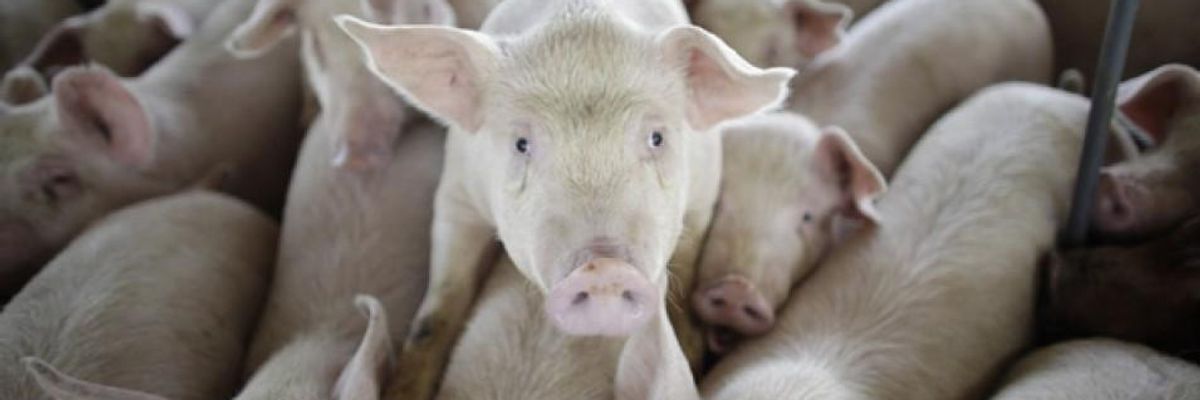As the coronavirus outbreak puts pressure on meat-packing plants and food supply chains across the U.S., millions of pigs and chickens are being cruelly put to death in the nation's factory farms--with animals being intentionally suffocated in layers of foam or by having their ventilation cut off.
"It is a black swan event," agriculture consultant Adam Speck told the Guardian. "There are hogs available. We are full to the brim. But when we are down about 23% in hog harvesting capacity and we can't process at normal rates, then the only option is to depopulate."
The term "depopulate" is a meat industry term that refers to the mass killing, or culling, of animals. According to Leah Garces of the group Mercy for Animals, the methods used to kill the creatures--though approved (pdf) by the American Veterinary Medical Association (AVMA)--are extreme and inhumane.
As the Guardianreported:
In a letter this month to leading poultry companies, Mercy for Animals called AVMA culling methods--which include water-based foam generators, whole-house gassing and ventilation shutdown--inhumane.
Foaming means covering hens with a layer of foam that blocks their airways, gradually suffocating them over several minutes. Ventilation shutdown, meanwhile, although described by the AVMA as "not preferred," is one of the cruellest, but cheapest options, said Garces. "Shutting down broiler chicken house ventilation systems means animals die of organ failure due to overheating, as temperatures quickly rise."
"Foam is a horribly inhumane way to kill birds," poultry scientist Dr. Ian Duncan said of the practice in 2006. "You can't tell if they are suffering or vocalizing because they are covered up."
According to Mercy for Animals:
In a story on Monday, Reuters noted that the sheer numbers of creatures being killed are hard to fathom as tens of thousands of chickens are being culled at a single farm.
The news outlet also reported on the treatment of young hogs:
In Iowa, farmer Dean Meyer said he is part of a group of about nine producers who are euthanizing the smallest 5% of their newly born pigs, or about 125 piglets a week. They will continue euthanizing animals until disruptions ease, and could increase the number of pigs killed each week, he said. The small bodies are composted and will become fertilizer.
As Common Dreams reported, President Donald Trump in an executive order Tuesday declared meat packing plants "critical infrastructure" and ordered them to remain open as concerns continue to mount over the medium to long term prospects for the country's food supply. But critics noted that the move was more aimed at maintaining the profits of agribusiness than at providing people with food and that worker safety at the plants did not appear to be a priority to the administration.
"The meatpacking industry is already one of the most dangerous industries in the United States, with injury rates twice the national average and illness rates 15 times the national average," the National Employment Law Project's worker safety and health program director Debbie Berkowitz said in a statement late Tuesday. "The black, brown, immigrant, and refugee workers who are disproportionately represented in the meatpacking industry will bear the brunt of this dangerous decision."
In a statement Wednesday, the Animal Welfare Institute's farm animal program director Dena Jones warned that worker safety and animal treatment at meat processing plants often go hand-in-hand.
"In our experience, plants that don't treat animals well often don't treat workers well," said Jones. "It's a reflection of management placing profits over the well-being of the living resources that make those profits possible."

